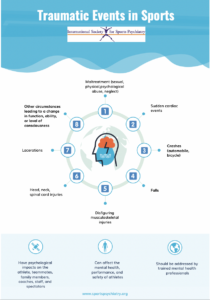Psychological Aftermath of Trauma Extends Beyond Athletes
Introduction
Risks are inherent in sports. Athletes engage in training and competition with an awareness that injury may occur. Certain sports (e.g. combat, collision, high speed or extreme) are intuitively associated with a greater potential for more severe injuries; however unexpected medical events can occur at any time.
Buffalo Bills Safety Damar Hamlin Suffers Cardiac Arrest
As millions watched the final Monday Night Football game for the 2022-2023 National Football League (NFL) regular season, which had significant playoff implications for both teams involved, the game was abruptly halted when Buffalo Bills safety Damar Hamlin collapsed to the ground following what appeared to be a routine defensive tackle. The events that followed left the sports world shocked and silent. The need for medical attention rapidly shifted to resuscitative efforts, as the player required cardiopulmonary resuscitation (CPR) assisted by an automated external defibrillator (AED) for nearly 20 minutes. Time stood still and millions held their collective breaths as they awaited word about Hamlin’s condition. As the silence stretched on, one thing was clear: the only thing that mattered was Hamlin’s condition. Sport receded into the background as the gravity of life distilled into the foreground. The game was rightfully suspended as players and staff stood, kneeled, or sat with shock and concern etched on their faces. Many hugged and supported each other – the humanity of the athletes, coaches, and staff on full display.
In the days that followed Hamlin’s medical emergency, the emotional impact of the shared experience of everyone who watched or was involved with the Monday night game brought awareness to the psychological aftermath of traumatic events in sports.
Traumatic Events in Sports
Traumatic events in sports can include (see infographic illustration):
- sudden cardiac events
- dramatic crashes (including automobiles or bicycles)
- falls
- disfiguring musculoskeletal injuries
- head, neck and spinal injuries
- lacerations
- other circumstances that lead to a change in function, ability, and level of consciousness of the individual(s) affected.
Traumatic events in sports sometimes involve fatalities. The psychological impact of the traumatic event can be experienced by the individual experiencing the event, their family members, coaching and support staff, other participants, training and medical staff, and spectators.
Individuals who have had exposure to actual or threatened death, serious injury or sexual violence through direct experience, witnessing, or learning about traumatic events may develop acute stress disorder or posttraumatic stress disorder (PTSD) (1). Athletes can be involved with traumatic events both inside and outside of sports. The clinical presentations of these disorders can include fear-based emotional and behavioral symptoms, dysphoric mood states, negative cognitions, insomnia, or combinations of these features. The significance and overall disruptive quality of the event varies among people experiencing the same event. Situational, emotional, and neurobiological factors associated with traumas influence the impact of the event (2,3,4).
Athletes who have been exposed to traumatic events may experience impaired concentration, anxiety, fear of being injured, and altered reaction times. They are at increased risk of injury, and the history of trauma may interfere with rehabilitation5.
Conclusion
- Traumatic events in sport unify communities regardless of nation or team affiliation.
- Mobilization of support is extremely important in contributing to positive outcomes and increasing capacity for resilience.
- Some athletes, staff and fans may develop acute stress disorder or PTSD.
- Important elements that must occur before the teams take the field again include support and counseling from mental health professionals for players, coaches, staff, and training staff to address their trauma.
- The role of mental health professionals in sports extends far beyond performance: their role in validation, debriefing, and support is essential in allowing team members to process their trauma and be able to move forward.
Infographic

Author Affiliation
Carla D. Edwards, MD, FRCPC
Assistant Clinical Professor, McMaster University Department of Psychiatry and Behavioral Neurosciences
Hamilton, Ontario, Canada
President, International Society for Sports Psychiatry
e-mail: edwardcd@mcmaster.ca
Twitter : @Edwards10Carla
References
- American Psychiatric Association. Diagnostic and statistical manual of mental disorders (5th ed.) Washington, DC. American Psychiatric Publishing, Inc., 2013. pp. 271-286
- vanZuiden M, Geuze E, Willemen HL, et al. Glucocorticoid receptor pathway components predict posttraumatic stress disorder symptom development: a prospective study. Biological Psychiatry 2012;71, 309-316.
- Adams RE, Boscarino JA. Predictors of PTSD and delayed PTSD after disaster: the impact of exposure and psychosocial resources. The Journal of Nervous and Montal Disease 2006;194, 485-493.
- Kazantzis N, Kennedy-Moffat J, Flett RA, et al. Predictors of chronic trauma-related symptoms in a community sample of New Zealand motor vehicle accident survivors. Culture, Medicine and Psychiatry 2012;36(3), 442-464.
- Wenzel T, Zhu LJ. Posttraumatic stress in athletes. In: Baron DA, Reardon C, Baron SH, eds. Clinical Sports Psychiatry: an International Perspective. New York: Wiley 2013. pp. 102–14.